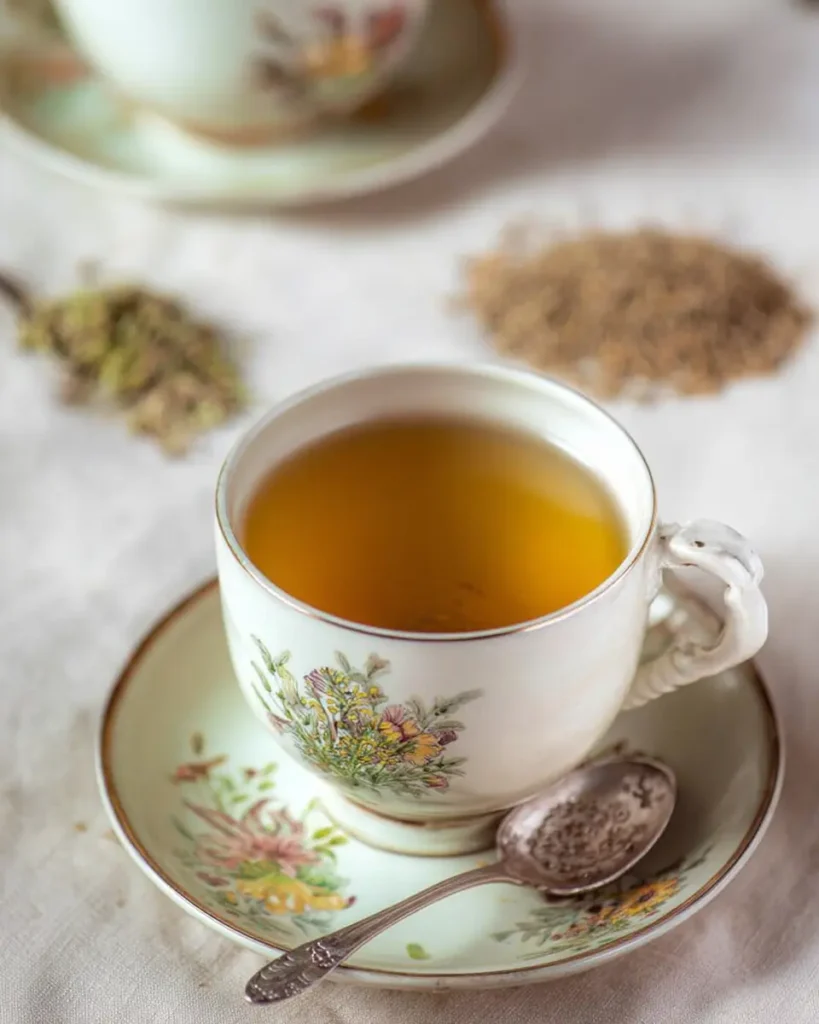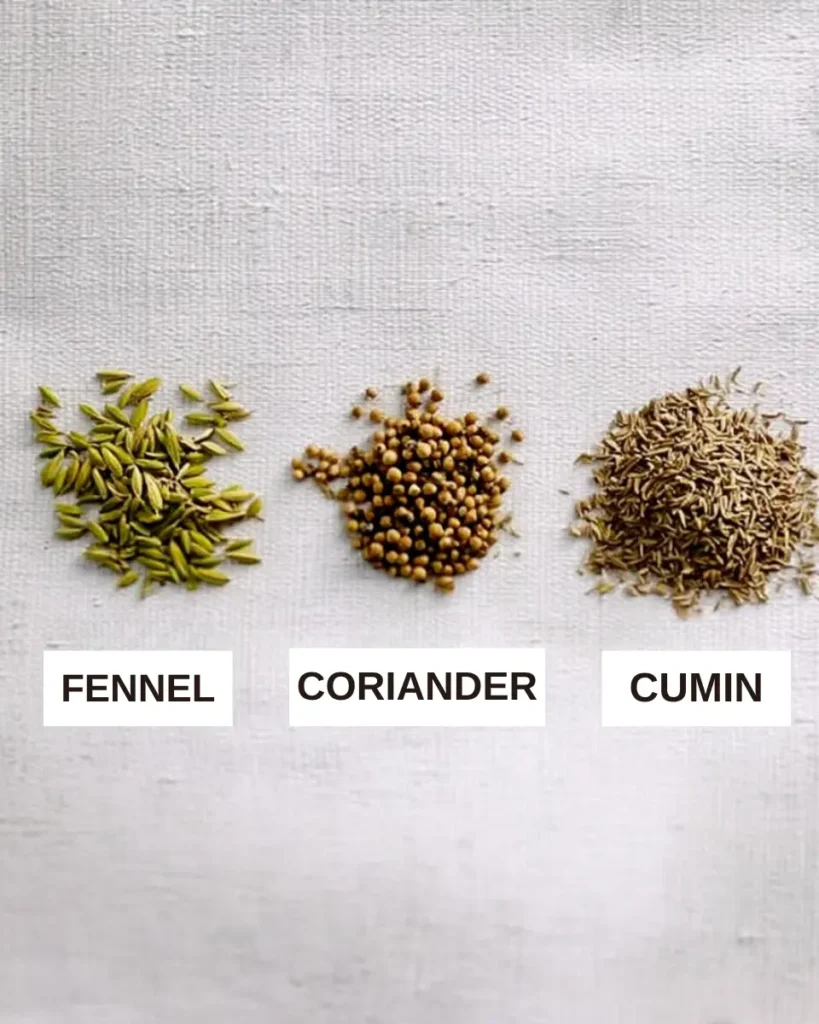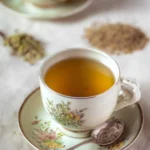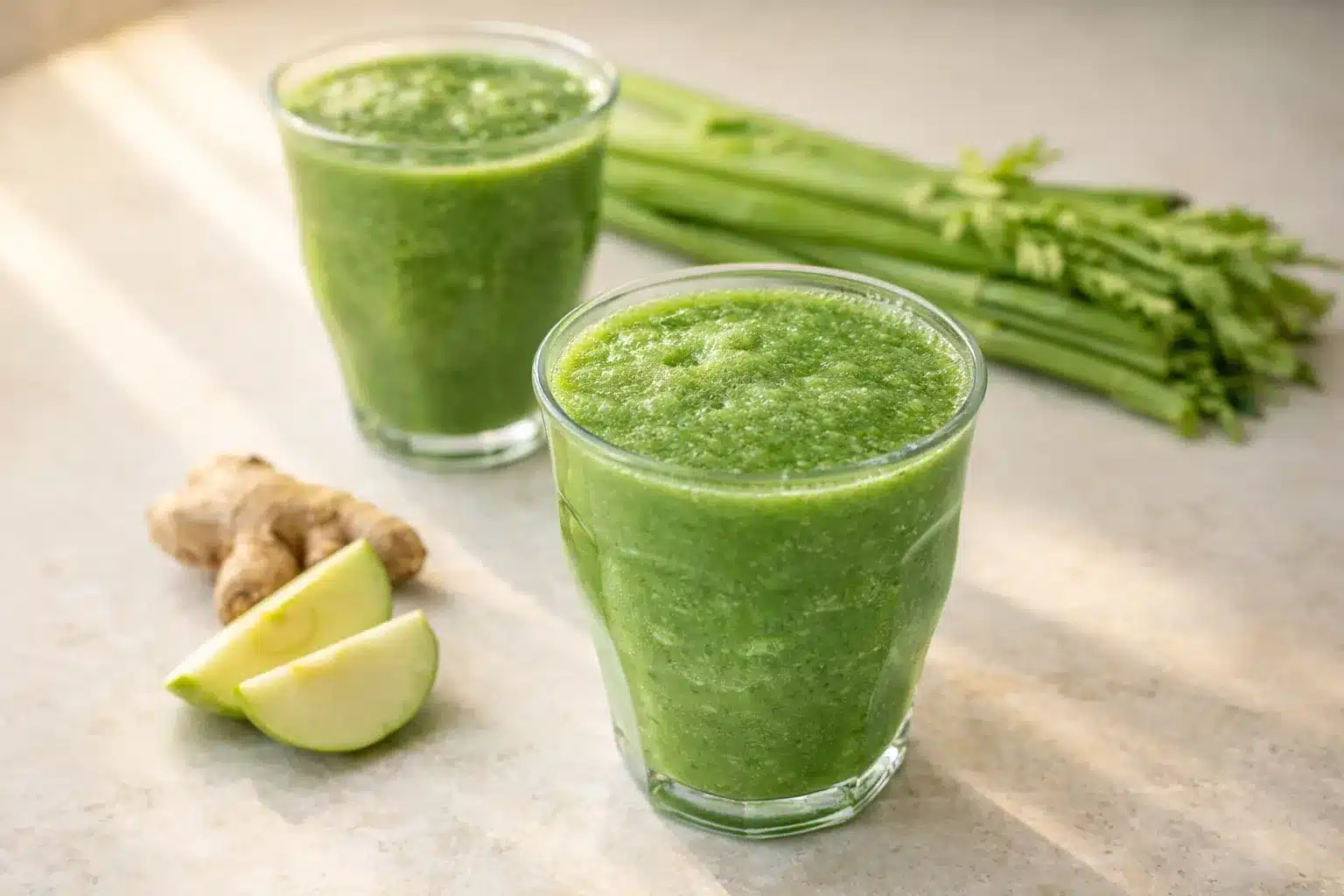The CFC tea recipe is one of those humble kitchen secrets that quietly transforms your day. I first brewed it after a restless night and too much takeout—just cumin, fennel, and coriander in a pot of simmering water. That warm, earthy sip felt like a gentle nudge back to balance. Now, this three-seed brew is my morning reset, my bloat-buster, and a daily act of self-care.

Table of Contents
What Is CFC Tea?
The CFC tea recipe stands for Cumin, Fennel, and Coriander tea—a simple yet powerful herbal blend rooted in Ayurvedic tradition. Known for its detoxifying and digestion-boosting benefits, this herbal tea is caffeine-free and incredibly easy to make at home.
To prepare the traditional CFC tea recipe, you only need a few pantry spices, some hot water, and about 8 minutes on the stove. The result is a golden, fragrant drink that’s light on the stomach but rich in wellness perks—from easing bloating to gently flushing out toxins. It’s no wonder this tea has become a go-to in many real, everyday kitchens.
The Meaning Behind Cumin, Fennel, and Coriander Tea
Each spice in the CFC tea recipe plays a role in supporting digestive health. Cumin seeds bring warmth and help fire up metabolism. Fennel seeds offer a sweet, cooling effect that calms gas and bloating. Coriander seeds lend a mild, citrusy bitterness that cools the system and supports gentle detox.
Together, they create a well-rounded brew that supports digestion, relieves discomfort, and refreshes the body from the inside out.

Origin and Traditional Uses in Ayurveda
The origins of the CFC tea recipe trace back to Ayurvedic medicine, where it’s used to enhance “Agni,” or digestive fire. Practitioners often recommend drinking this tea first thing in the morning or after heavy meals to move toxins, reduce bloating, and keep digestion on track.
In India, CFC tea has long been used as a natural remedy for heartburn, acidity, and water retention. It’s praised for being both potent and gentle—safe enough for daily use, yet effective enough to make a real difference in how your gut feels.
Why You Should Try CFC Tea
If you’ve been feeling sluggish, bloated, or just off after meals, the CFC tea recipe might be exactly what your gut needs. It’s a simple herbal tea that works in quiet, effective ways—clearing digestive stagnation, calming the belly, and even helping with water retention. Unlike trendy detox drinks that can be harsh or gimmicky, this one’s gentle, rooted in tradition, and easy enough for daily use.
The beauty of the CFC tea recipe is how it fits into real life. Whether you’re resetting after a weekend of indulgence or just trying to support everyday digestion, this three-seed blend has your back—without caffeine, chemicals, or fuss.
Who It’s Good For: Digestion, Bloating, Detox, and More
The CFC tea recipe is especially helpful for anyone dealing with:
- Bloating or gas after meals
- Slow digestion or irregularity
- Mild fluid retention
- Heartburn, acidity, or heaviness
It’s also great if you’re looking for a natural daily detox without going on an extreme cleanse. Ayurvedic practitioners often suggest it for balancing all three doshas—making it suitable for most body types.
And for those managing their weight or working on gut health, this tea acts as a gentle assistant. It supports the digestive process so your body can do its job more efficiently.
When to Drink It (Morning, After Meals, or Bedtime)
The best time to enjoy the CFC tea recipe is in the morning on an empty stomach. This helps wake up your digestion, flush out toxins, and set a soothing tone for the rest of your day.
You can also sip it after a heavy meal to ease bloating or midday if you’re feeling sluggish. That said, avoid drinking CFC tea too close to bedtime—it has diuretic properties and might keep you up with bathroom trips.
Some people drink it twice a day, but even once daily is enough to notice benefits over time. Think of it as a small, healing ritual your gut will thank you for.
Ingredients You’ll Need

One of the best parts about the CFC tea recipe is how easy it is to throw together. You don’t need fancy ingredients or a trip to a specialty store—just three everyday spices that might already be sitting in your pantry.
Each spice plays a role in the flavor and the function of this tea. And if you’re someone who likes to add a personal twist, there are a few optional add-ins that pair beautifully with this blend.
Core Spices (Cumin, Fennel, Coriander Seeds)
For the base of your CFC tea recipe, you’ll need:
- ½ teaspoon cumin seeds – Pungent and earthy, these help spark digestion and metabolism.
- ½ teaspoon fennel seeds – Sweet and cooling, perfect for soothing bloating and gas.
- ½ teaspoon coriander seeds – Citrusy and mild, supports detox and cools internal heat.
Pro tip: Mix equal parts of all three and store them in a small jar. That way, your morning cup of CFC tea is just one scoop away.
Optional Add-ins (Lemon, Ginger, Honey, etc.)
Want to dress up your CFC tea recipe a little? These extras add a boost of flavor and benefits:
- Fresh ginger slices – Adds warmth and extra digestive power.
- Lemon juice – Brightens the flavor and enhances cleansing properties.
- Raw honey – A touch of natural sweetness, best added once the tea has cooled a bit to preserve its nutrients.
- Pinch of cinnamon – Brings a cozy, spiced note that pairs beautifully with fennel.
Keep in mind, the classic version is effective on its own—but these add-ins are great if you want to change things up or ease into the taste.
How to Make CFC Tea (Step-by-Step)
Brewing the perfect CFC tea recipe is refreshingly simple. With just a small saucepan, a spoonful of seeds, and under 10 minutes, you can create a daily wellness ritual that feels grounding and nourishing. Here’s exactly how to make it.
Step 1 – Toasting or Soaking the Spices
Before adding the seeds to water, you have two options:
- Toasting: Lightly dry-toast the cumin, fennel, and coriander seeds in a warm pan for 30–60 seconds. This releases their essential oils and boosts aroma. Be careful not to scorch them—a light toasting is enough to release their aroma.
- Soaking method: In hotter climates or when you want a milder infusion, steep the seeds in hot water for about 15 minutes without boiling. This is preferred in cooling Ayurvedic practices.
Either approach can be effective—choose based on your preference and daily rhythm.
Step 2 – Boiling and Simmering
For the traditional CFC tea recipe method:
- Bring 4 cups of water to a boil.
- Stir in half a teaspoon each of cumin, fennel, and coriander seeds.
- Reduce to a simmer, cover the pot, and let it brew for 5 to 8 minutes.
- The longer it simmers, the stronger the flavor and effects.
Optional: Add a slice of ginger or pinch of cinnamon here if using.
Step 3 – Straining and Serving Tips
Pour the tea through a fine strainer into your cup before serving. Drink it warm for the best digestive benefits.
- If you’re adding lemon or honey, let the tea cool slightly so you don’t destroy the enzymes.
- For busy mornings, you can brew a full batch and store it in a thermos to sip throughout the day.
Cold Brew or Overnight Soak (Optional)
If you’d rather skip the stove, the CFC tea recipe can be cold-infused:
- Add ½ tsp each of the three seeds to a large jar of room-temperature water.
- Let it steep overnight.
- Strain and drink first thing in the morning.
This version is more subtle in taste and better for warmer seasons or Pitta-dominant constitutions in Ayurveda.
CFC Tea Taste Profile – What to Expect
If you’re trying the CFC tea recipe for the first time, you might be wondering what it actually tastes like. Let’s just say—it’s not your typical sweet herbal tea, but it grows on you in a surprisingly comforting way.
The flavor is warm, earthy, and slightly savory, with a gentle sweetness from fennel that balances the bitterness of cumin and coriander. Think of it as a sip that speaks more to your gut than your sweet tooth—soothing, clean, and grounding.
Flavor Notes of Each Spice
- Cumin adds a toasted, slightly bitter flavor with deep, earthy notes.
- Fennel brings a soft licorice sweetness that rounds everything out.
- Coriander adds citrusy, nutty undertones that feel light and cooling.
Together, these three create a complex but mellow profile—one that feels medicinal, in the best way.
How to Adjust the Taste (Sweeter, Stronger, etc.)
Don’t love it at first sip? You can easily customize the CFC tea recipe:
- For a stronger brew: Simmer longer (up to 10 minutes) or slightly increase the seed quantities.
- To sweeten naturally: Add a drizzle of raw honey or a pinch of cinnamon once the tea cools.
- To brighten it: Squeeze in fresh lemon juice just before drinking.
It’s not meant to taste like a dessert—it’s meant to feel like a reset. And with a few tweaks, you’ll find your perfect version.
Health Benefits of CFC Tea
The real magic of the CFC tea recipe lies in what it does beyond the cup. It’s not just warm and soothing—it actively supports your digestive system, metabolism, and overall gut balance. Each seed contributes uniquely, making this a go-to tea for bloating, sluggish digestion, and gentle detox.
In Ayurvedic tradition, this tea is valued for kindling the body’s digestive fire—known as “Agni”—supporting natural detox and helping maintain internal harmony. And the best part? It’s gentle enough for daily use, without the harsh effects of trendy detox teas.
Benefits of Cumin – Metabolism, Digestion, Immunity
Cumin seeds are tiny powerhouses. In the CFC tea recipe, they bring warmth and a subtle bitterness that helps stimulate digestive enzymes. Here’s what they offer:
- Boost metabolism and support weight loss
- Reduce bloating, acidity, and heartburn
- Contain iron and antioxidants that support immune function
Cumin is especially helpful after heavy or greasy meals—it helps your body process fats more efficiently.
Benefits of Fennel – Bloating, Hormonal Balance
Fennel is the sweet and cooling counterpart in this tea. It works wonders for:
- Soothing bloating and trapped gas
- Easing cramps or discomfort in the digestive tract
- Supporting hormonal balance, especially during PMS or postpartum
- Acting as a gentle expectorant for respiratory relief
Its naturally sweet flavor also makes the CFC tea recipe more palatable, especially for beginners.
Benefits of Coriander – Detox, Skin, Blood Sugar
Coriander rounds out the blend with its cooling, cleansing qualities. Benefits include:
- Supporting gentle detox of liver and kidneys
- Helping regulate blood sugar and cholesterol
- Soothing skin conditions from the inside out
It’s also rich in Vitamin C and acts as a natural diuretic, making it helpful for water retention and inflammation.
How and When to Drink CFC Tea for Best Results
If you’re wondering when to sip your cup of CFC tea, you’re not alone. Timing can actually make a big difference in how effective the CFC tea recipe is for digestion, detox, and energy. Fortunately, this tea is flexible—you can fit it into your routine in a way that works best for your body.
Morning Routine or Bedtime Drink?
The CFC tea recipe is most effective when consumed first thing in the morning, on an empty stomach. This helps kickstart digestion, gently wake up your system, and flush out overnight toxins. It’s a small ritual that sets the tone for smoother digestion throughout the day.
Even though it might seem like a good idea to have a cup after a heavy dinner, drinking CFC tea late in the evening isn’t ideal—its mild diuretic effect could interrupt your sleep. It has mild diuretic properties, which means late-night sipping might lead to extra bathroom trips.
That said, some people enjoy a second cup after lunch, especially if the meal was rich or heavy. It’s a great way to reduce post-meal bloat and discomfort.
How Many Times Per Day Is Safe?
You can safely drink the CFC tea recipe once or twice a day. Most people start with a morning cup and stick to that as their daily dose.
Here’s a quick guideline:
- 1 cup/day → Great for general digestion and maintenance
- 2 cups/day → Helpful if you’re actively working on bloating or detox
- More than 2 cups? Not recommended—it could lead to over-cleansing or dehydration
Just remember, consistency is key. This tea isn’t about instant results—it’s about building a gut-friendly habit that works gently over time.
Variations and Additions You Can Try
Once you’ve got the basic CFC tea recipe down, you might want to switch things up. The good news? It’s super versatile. You can easily tweak the flavors or boost the benefits with a few natural add-ins that pair beautifully with cumin, fennel, and coriander.
Here are two easy, feel-good variations to try:
With Ginger or Cinnamon for Extra Warmth
- Fresh ginger slices (¼ to ½ inch piece) add a spicy, invigorating kick. It’s great for cold mornings or when your digestion needs an extra nudge.
- A pinch of cinnamon brings cozy warmth and a hint of sweetness while supporting blood sugar balance.
These spices blend beautifully with the base CFC tea recipe and make it even more comforting in cooler weather.
Lemon & Honey for Taste and Detox Boost
- Lemon juice (½ to 1 tsp per cup) adds brightness and enhances the detox effect.
- Raw honey can sweeten things naturally—just make sure to add it after the tea cools a bit, so you don’t destroy its beneficial enzymes.
These additions make the CFC tea recipe more appealing if you’re easing into the taste or want a smoother, more citrus-forward cup.
Common Mistakes to Avoid When Making CFC Tea
The CFC tea recipe is beautifully straightforward, but there are a few easy missteps that can affect both its flavor and how well it supports your digestion. Keep these in mind for the best cup every time.
Mistake #1: Letting the Seeds Boil Too Vigorously
High heat might seem like a shortcut, but boiling the seeds too aggressively can make the tea taste bitter and reduce its soothing properties.
Better approach: Keep the heat low and let the seeds simmer gently. Think of it as coaxing out the goodness, not rushing it.
Mistake #2: Using Ground Spices Instead of Whole Seeds
While it might seem quicker, swapping in powdered spices changes both the texture and flavor of the tea.
Best practice: Stick to whole cumin, fennel, and coriander seeds. Ground versions tend to make the tea overly intense and leave behind a chalky feel.
Related Recipes You’ll Love
If you’re enjoying the benefits of the CFC tea recipe, you’ll probably love these other gentle, belly-soothing drinks:
- Try this comforting Tummy Tea Recipe — a calming blend perfect for digestion and relaxation.
- Looking for a hydration boost with fiber? Don’t miss this refreshing Chia Seeds Water—great for gut health and fullness.
- Browse our full list of detox drinks for more simple recipes to support wellness, naturally.
Each one pairs beautifully with a mindful morning routine or an afternoon pick-me-up.
FAQs About CFC Tea
Here are answers to some of the most common questions about the CFC tea recipe, so you can sip with confidence and clarity.
Can I drink CFC tea every day?
Yes, the CFC tea recipe is safe for daily use—especially when consumed in moderation (once or twice a day). Many people find that drinking it each morning helps improve digestion, reduce bloating, and support regular elimination over time. Just listen to your body, and don’t overdo it.
Is it safe during pregnancy or breastfeeding?
It’s best to check with your healthcare provider before introducing any herbal teas during pregnancy or while breastfeeding. While the ingredients in the CFC tea recipe are generally mild, some sources suggest avoiding large amounts of fennel and coriander during pregnancy due to hormonal properties. That said, some women have found that small amounts of this tea can offer gentle relief from postpartum digestive issues.
Can I make a large batch and store it?
Absolutely. You can double or triple the CFC tea recipe and store it in a glass bottle or thermos for up to 24 hours in the fridge. Reheat gently or enjoy at room temperature. Just avoid letting it sit too long, as the flavor and potency can fade.
Can I use powdered spices instead of seeds?
Technically, yes—but it’s not recommended. The traditional CFC tea recipe uses whole seeds to gently release essential oils. Using powdered spices often results in a murky brew with an overpowering taste and grainy texture. For best results, stick with the whole form.
Final Thoughts – Is CFC Tea Worth Trying?
If your body’s been feeling a little off—heavy, bloated, or just out of rhythm—the CFC tea recipe is one of those small, doable changes that can make a real difference. It’s not flashy, but it works quietly and consistently, like most good things in the kitchen.
It’s become a go-to part of my morning routine—not because it’s trendy, but because it makes my body feel more at home. Whether you’re easing into Ayurvedic habits or just looking for a natural way to support digestion, this simple three-seed tea is absolutely worth a try.
Need a little visual inspiration? You can save and share this recipe on Pinterest so it’s always at your fingertips when your belly needs a reset.
All you need is ten minutes, a pot of water, and a few seeds—and you just might find yourself coming back to it again and again.
Print
CFC Tea Recipe (Cumin, Fennel, Coriander) – Easy Ayurvedic Detox Drink
- Total Time: 9 minutes
- Yield: 4 servings 1x
- Diet: Gluten Free
Description
A simple, Ayurvedic cumin-fennel-coriander tea known to aid digestion, reduce bloating, and gently detox the body. Great for mornings!
Ingredients
½ tsp cumin seeds
½ tsp fennel seeds
½ tsp coriander seeds
4 cups water
Optional: fresh ginger, lemon juice, cinnamon, raw honey
Instructions
1. Bring 4 cups of water to a boil.
2. Add cumin, fennel, and coriander seeds.
3. Reduce to a simmer, cover, and let steep for 5–8 minutes.
4. Strain into mugs.
5. Add optional ingredients (like lemon or honey) after cooling slightly.
6. Enjoy warm, preferably in the morning.
Notes
You can toast the seeds before simmering for added flavor.
To save time, mix equal parts of all three seeds in a jar.
Store leftover tea in the fridge for up to 24 hours and reheat as needed.
- Prep Time: 1 minute
- Cook Time: 8 minutes
- Category: Drink
- Method: Stovetop
- Cuisine: Ayurvedic
Nutrition
- Serving Size: 1 cup
- Calories: 20
- Sugar: 1g
- Sodium: 6mg
- Fat: 1g
- Saturated Fat: 1g
- Unsaturated Fat: 1g
- Trans Fat: 0g
- Carbohydrates: 3g
- Fiber: 2g
- Protein: 1g
- Cholesterol: 0mg



